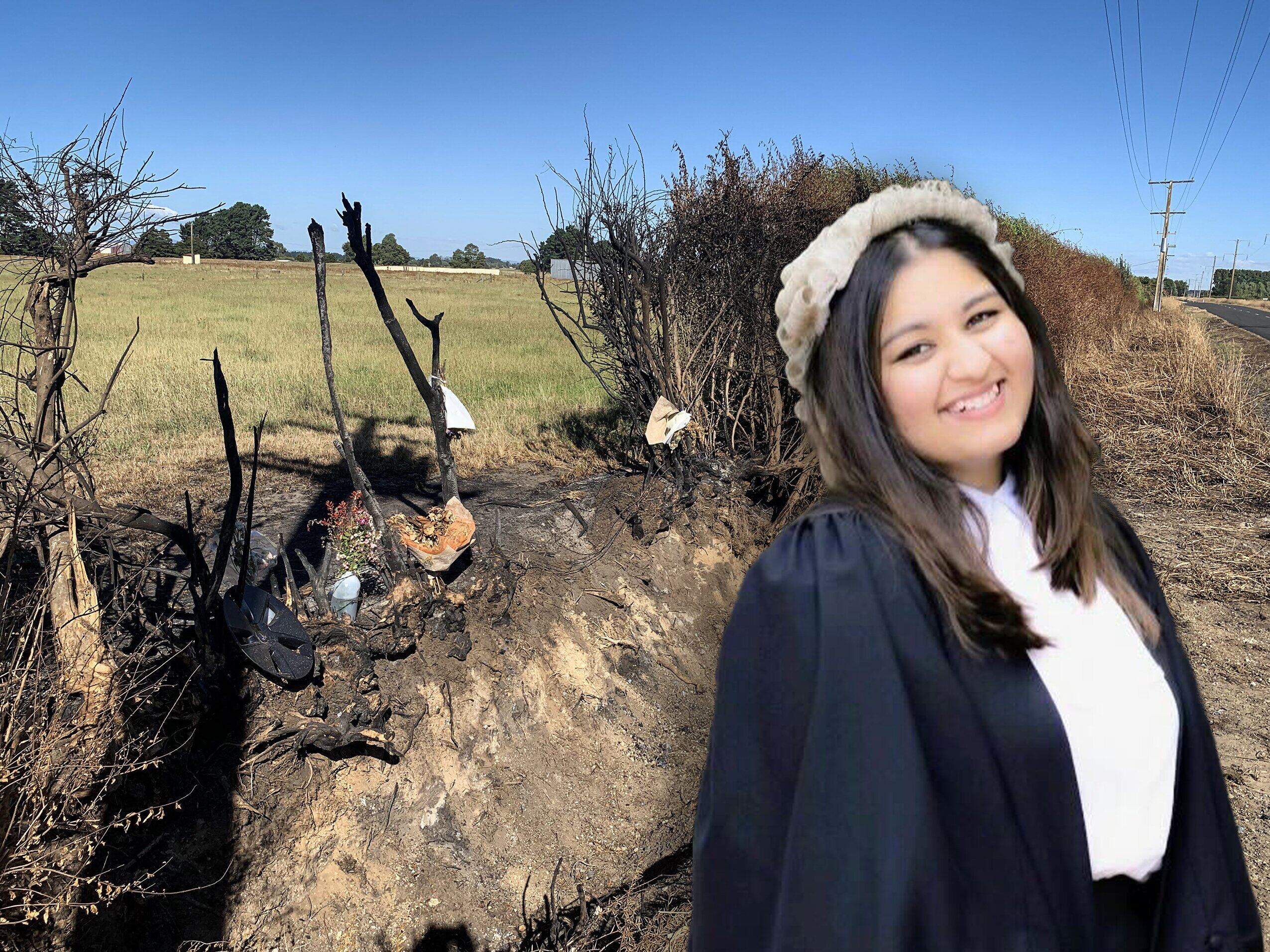
TESLA CRASH: FAMILY OF CRASH VICTIM TAKE AIM AT KILLER DRIVER SAURBH SHARMA
A heartbroken and inconsolable mother was helped from a courtroom after telling the man responsible for her daughter’s death in a fiery crash that “God will never forgive you”.
Auckland man Saurbh Sharma defended a charge of careless driving causing the death of young lawyer Shubham Kaur in a crash in Taupiri in 2022 but was found guilty after a five-day trial earlier this year.
Judge Glen Marshall rejected the 26-year-old’s defence, including his “remarkable and implausible” contention that his search for “how to delete Tesla recordings” on his iPhone immediately after the crash was caused by the phone’s auto-populate function.
At Sharma’s sentencing in the Hamilton District Court today, Kaur’s mother Rajinderpal, told Sharma he had “snatched all of the happiness from our house”.
“If it was an accident he should have sought help from someone to move her from the car.
“He had 20 minutes before he saved himself but left her in the car.
“After hearing the evidence that Saurbh Sharma searched ‘how to delete Tesla recordings’, this has made us feel disgusted.
“You didn’t do good to my child. God will never forgive you.”
Sharma - who already had a conviction for driving at a dangerous speed from 2017 - was driving on Dawson Rd, Taupiri, on January 4, 2022, when he hit a dip in the road before getting airborne, then sliding for about 60m, and landing on the embankment and sliding further, and crashing through a power pole.
A nearby neighbour called 111 after hearing the car at 4.09pm. Two minutes later, telco data from Sharma’s phone revealed he made the Tesla recording search, before calling 111 at 4.12pm.
The neighbours then noticed smoke coming from the car, and told Sharma to get out, which he did, before it burst into flames.
At his trial, Sharma contended he wasn’t speeding, he’d swerved to avoid a raccoon and that he’d dragged Kaur from the car onto the grass about a metre away.
The 22-year-old’s remains were later found underneath the car.
Judge Marshall said Sharma’s raccoon explanation was also “implausible”, especially given his upset state at the time, and showed his evidence was “clearly unreliable” as the gauge marks on the road were in a straight line and not on an angle which would have suggested he had swerved.
He found that Sharma came up with that scenario as he thought he might be found culpable for what happened.
Judge Marshall found Sharma was distracted driving on a road he’d never driven before and not noticing the “dip” in the road ahead of him.
The judge cited supplied evidence that Dawson Rd was used by 300 to 500 cars each day, yet there’d only been one other serious crash in that area since 2017.
“He was on an unfamiliar rural road, he should have been paying careful attention to the road conditions,” Judge Marshall said.
After the car bottomed out on the dip, Sharma likely panicked causing him to brake and lose control of the car.
Police prosecutor Sergeant Nicola Morrison submitted Sharma should not get any credit for a plea, remorse or restorative justice (RJ).
Although he had earlier offered to attend RJ, she doubted it would have been “overly fruitful” given his comments to a pre-sentence report writer that he was also a victim and still had not accepted responsibility for what happened.
Given his driving that day, the case should fall at the higher end of carelessness.
‘Momentary lapse of judgment’
Defence counsel Ashley Oh said her client didn’t intend to downgrade or minimise the impact on the victim’s family and believed his comments in the report had been misinterpreted.
He filed an affidavit with the court to try and clarify the perceived sense of entitlement and denial.
A distinguishing feature of the case was that her client’s inattention was a “momentary lapse of judgment” rather than a more continuing act.
“A community work sentence is a significant sentence,” Oh said, suggesting 200 hours along with a six-month driving disqualification.
He’d also saved up $7000 to pay as emotional harm reparation, which the family later refused to accept.
They instead asked for it to be paid to an Indian temple in Auckland.
It was during Oh’s submissions that Kaur burst into tears and had to be helped from the court.
She later returned for Judge Marshall’s decision, but as he handed down a sentence of three months community detention, 150 hours community work, 12 months driving disqualification, and the paying of the reparation, Kaur yelled, “[it was] no accident”.
“He killed my daughter. I don’t want $7000. He killed my daughter.”
‘Treasured life taken far too early’
Minutes earlier Judge Marshall told the court that nothing he did would return Kaur to her family.
“Any sentence I impose will not go any way towards compensating [the family] for a treasured life taken far too early.”
He also noted Sharma’s continued denial and agreed that he couldn’t issue any discount for remorse but other mitigating factors included his young age, limited conviction history, emotional harm payment and the fact he’d since put his career as a chartered accountant “on hold” and was willing to do restorative justice.
However, that didn’t spare the victim’s family from having to sit through days of “very confronting and very challenging evidence”.
Asked about the refusal of the reparation payment outside court afterwards, Kaur’s brother, Manjeet Singh, said his mother didn’t want Sharma’s money.
“She’s thinking he’s valuing her daughter at $7000.”
With sentencing now behind them, their next aim is to try and find some closure, he said.
Belinda Feek is an Open Justice reporter based in Waikato. She has worked at NZME for nine years and has been a journalist for 20.
2024-07-05T07:28:53Z dg43tfdfdgfd